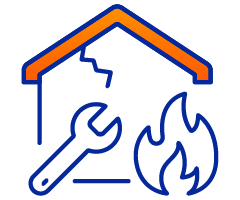Start Here
Homepage Bottom Form
We will get back to you as soon as possible.
Please try again later.
How to Help Kids Cope After a House Fire
🧸 How to Help Kids Cope After a House Fire
Created by House Fire Solutions – Supporting Families Through Healing and Rebuilding
When a fire disrupts your child’s world, it can shatter their sense of safety, routine, and trust. Children process trauma differently from adults — often through behavior, play, and emotional signals instead of words.
This checklist offers clear, age-sensitive steps to help your kids heal, rebuild confidence, and feel safe again.
❤️ 1. Provide Safety and Reassurance (First 24–72 Hours)
Children need to know they’re safe — even if the home isn’t.
- Calmly tell them: “You’re safe now. We’re together, and that’s what matters.”
- Maintain physical closeness — hugs, holding hands, and eye contact.
- Avoid exposing them to news, photos, or social media about the fire.
- Let them bring or hold a comfort item (stuffed animal, blanket, toy).
- Explain what happened in simple, honest terms — avoid scary or vague language.
- Emphasize what’s being done to fix things: “The firefighters helped. Now we’re finding a new place to stay.”
- Reassure them that the fire was not their fault.
- Stay calm and consistent — your stability is their anchor.
💡 Pro Tip: Young children interpret your emotions as their reality — when you sound calm, they feel safe.
🧍♀️ 2. Reestablish Routines and Normalcy
Structure restores a child’s sense of control.
- Create a predictable daily routine, even if in temporary housing.
- Maintain normal wake-up, meal, and bedtime schedules.
- If displaced, unpack a few familiar items right away (toys, blankets, books).
- Involve kids in small daily choices (“Do you want pancakes or cereal?”).
- Set up a simple chart for daily activities — it gives kids predictability.
- Encourage school attendance or online learning as soon as possible.
- Keep traditions alive (storytime, weekend breakfast, prayers, etc.).
💡 Tip: Kids don’t need everything to be perfect — they need consistency and connection.
💬 3. Talk About the Fire in a Healthy Way
Silence can make fear grow. Honest conversation helps healing.
- Let your child lead — answer only what they ask, with age-appropriate honesty.
- Use calm, factual language: “A fire started in the kitchen. The firefighters put it out. We’re safe now.”
- Avoid dramatic words like “disaster” or “everything’s gone.”
- Correct misconceptions gently (many kids secretly blame themselves).
- Encourage them to express feelings — through talking, drawing, or play.
- Normalize all emotions: sadness, anger, confusion, fear, even laughter.
- If your child doesn’t want to talk, that’s okay — keep communication open.
💡 Pro Tip: Repetition helps children process trauma — they may ask the same questions repeatedly.
🧠 4. Watch for Emotional or Behavioral Changes
Kids often express stress through behavior, not words.
- Common reactions include:
- Clinginess or separation anxiety
- Nightmares or fear of sleeping alone
- Bedwetting or regression (thumb-sucking, baby talk)
- Anger, tantrums, or aggression
- Withdrawal or quietness
- Headaches or stomachaches with no medical cause
- Reassure rather than punish — behavior is communication, not defiance.
- Respond with extra patience, comfort, and understanding.
- Encourage emotional expression (“It’s okay to feel scared. I’m right here.”).
- If symptoms persist or worsen after 2–4 weeks, consider professional help.
💡 Tip: Keep a “feelings log” — note triggers and comfort strategies that help.
🎨 5. Use Play, Art, and Storytelling for Healing
Creative expression helps children release emotions safely.
- Provide crayons, journals, or building blocks for open-ended play.
- Encourage them to draw their “safe place” or favorite memory.
- Read storybooks about overcoming loss or fear (“The Invisible String,” “A Terrible Thing Happened,” “After the Fire”).
- Write a “family superhero story” where your child helps save the day.
- Let play therapy happen naturally — don’t overanalyze it.
- Praise their courage and creativity.
💡 Pro Tip: Children often process trauma symbolically in drawings or play — that’s a healthy step toward healing.
👨👩👧 6. Strengthen Family Bonds
Love and connection are the foundation of recovery.
- Spend quality time together daily, even 10–15 minutes of focused attention.
- Eat meals together — shared time restores belonging.
- Talk openly about how everyone feels (model emotional honesty).
- Do comforting family activities — movie nights, board games, walks.
- Express affection frequently and verbally (“I love you,” “I’m proud of you”).
- Encourage siblings to support each other rather than compete for attention.
- If possible, visit or drive by the old home to provide closure, once it’s safe.
💡 Tip: Family rituals — even small ones — are powerful emotional stabilizers.
🧍♂️ 7. Seek Professional Support When Needed
Some kids need extra help to process trauma.
- Contact your pediatrician for mental health referrals.
- Seek a child psychologist or trauma therapist (ask for play therapy or CBT).
- Reach out to your insurance provider — many cover post-disaster counseling.
- Use school counselors or psychologists for ongoing support.
- Contact Red Cross, FEMA, or local non-profits for free emotional care.
- If your child shows self-harm talk or extreme withdrawal, call 988 (Suicide & Crisis Lifeline).
💡 Pro Tip: Getting help early prevents trauma from becoming long-term anxiety or depression.
🌈 8. Rebuild a Sense of Safety and Hope
Show your child that life can be rebuilt — beautifully.
- Involve them in small rebuilding tasks (“Pick your new room color!”).
- Visit the construction site or new home to show progress.
- Let them name the new family pet or plant a “recovery tree.”
- Talk about community helpers (firefighters, volunteers, neighbors).
- Create a “hope board” with pictures of family goals and dreams.
- Celebrate milestones — even small wins like replacing toys or moving back home.
- Keep emphasizing: “Things can be fixed. We’re strong. We’ll get through this.”
💡 Tip: Rebuilding hope teaches resilience — one of the greatest life lessons after trauma.
💬 9. Take Care of Yourself Too
Your stability helps your child heal.
- Prioritize your own rest, food, and emotional support.
- Let friends and family help with meals, childcare, or errands.
- Attend counseling or support groups for parents.
- Practice self-compassion — you can’t pour from an empty cup.
- Share progress with your child: “We’re healing together, one day at a time.”
💡 Pro Tip: Children mirror your recovery — when they see you cope with strength, they learn to do the same.
🕯️ 10. Long-Term Emotional Resilience
Help your child grow stronger from this experience.
- Encourage gratitude by naming “3 good things” each night.
- Discuss the helpers and heroes that kept you safe.
- Remind them that they are brave, loved, and safe.
- Celebrate anniversaries as “Fire Recovery Day” — a symbol of growth.
- Continue therapy or check-ins for at least 6–12 months if needed.
- Tell them often: “This doesn’t define us — it made us stronger.”
💡 Tip: Recovery is a journey, not a destination — every small step matters.
💬 Final Words
“Children don’t just rebuild homes — they rebuild hearts.
Your patience, love, and steadiness will become their blueprint for strength.”
Our Team Helps You Navigate Insurance, Restoration, and Rebuilding
It is a long established fact that a reader will be distracted by the readable content of a page when looking at its layout.

Board-Up
Our Network of Board Up Specialist Will Secure your property fast

Temp Housing
We'll Help You Find Safe Shelter while you recover

Public Adjusters
Our Network of Fire Damage Adjusters Will Fight Help for a fair insurance payout

Investors
Our Partner Specializes in Buying Fire Damaged Homes So you Can Sell your home as-is

Content Cleaning
Restore what matters most

Restoration
Bring your home back to life

Attorneys
We have a network of Protect your rights and claims

Mental Health
Support for you and your family
Want To See If We Can Help You
If you'd like to speak with us today about purchasing Social Security, Personal Injury, Workers' Compensation or Employment Law Leads.
Homepage Bottom Form
We will get back to you as soon as possible.
Please try again later.